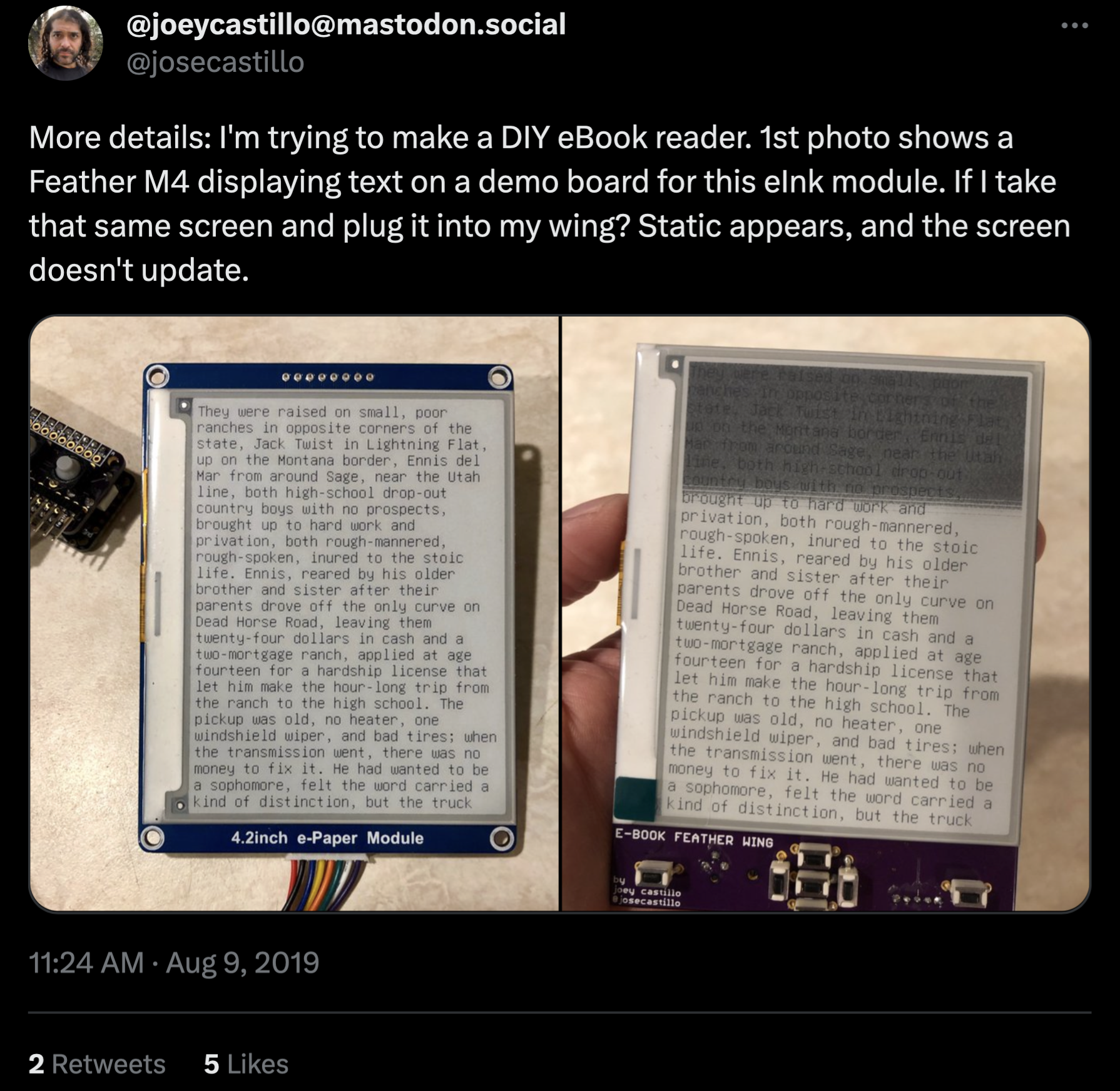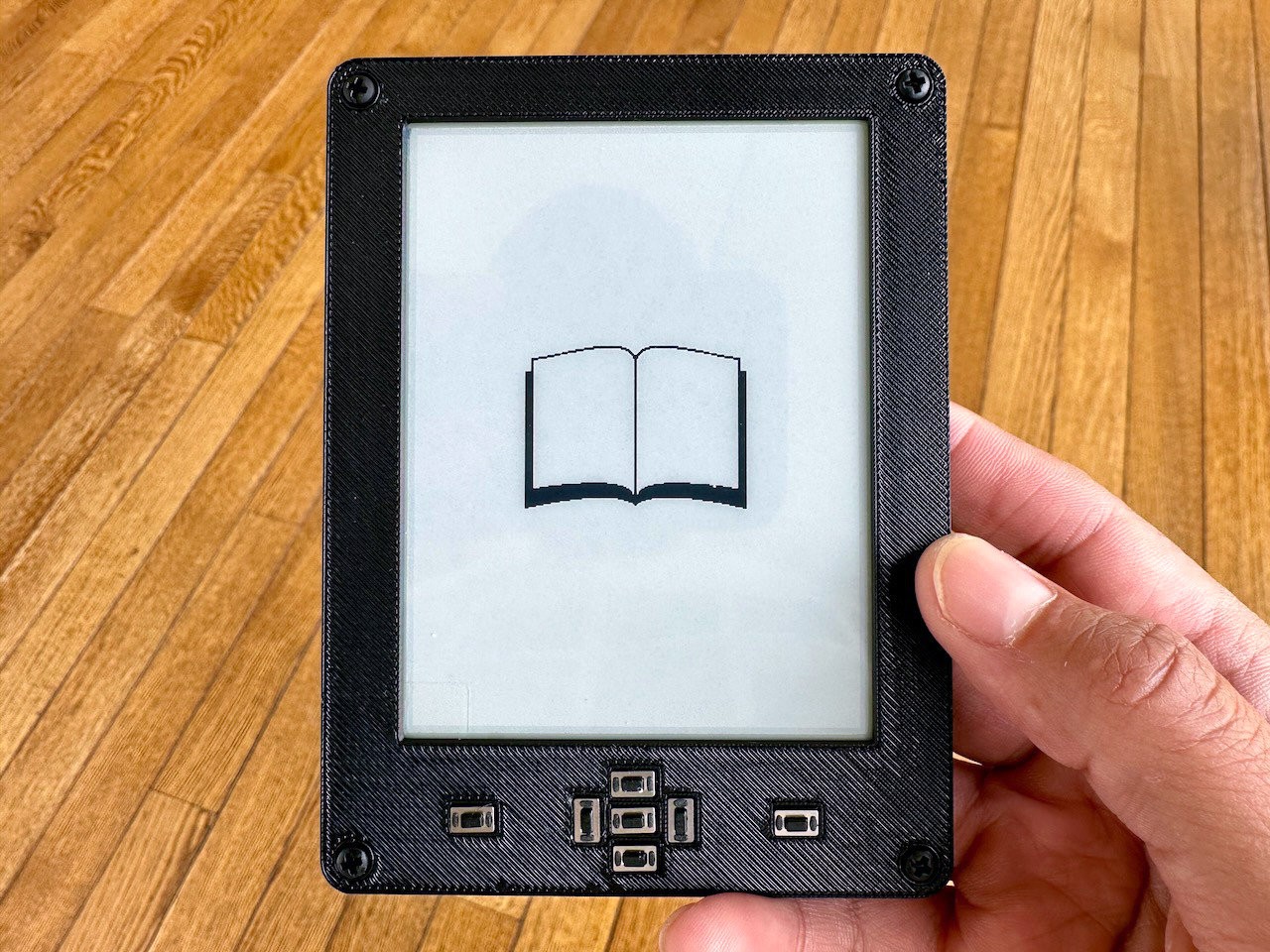NOTE: This project log was originally posted on 07/13/2023 at 18:10 EDT, but due to a misunderstanding, it had to be deleted and remade.
Hi y’all. It’s been a long time.
In case you’ve forgotten why you followed this project in the first place, a brief recap: the Open Book is an open hardware e-book reader, designed to be built from parts and understood by the reader who uses it. I searched today for the earliest references I could find to this project, and came up with this tweet from August 9th, 2019:

Looking back, it’s wild to think how little I knew back then — or perhaps more optimistically, it’s wild to think of how much I’ve learned since then. I didn’t have a background in electrical engineering when I set out to build this gadget; I wanted to build an e-book, and along the way, I taught myself what I thought I needed to know. To be clear: I’ve made mistakes along the way. In many ways, the early version gracing the cover of the Hackaday project page embodies a lot of those mistakes. But I’ve been working on it on and off ever since, learning more and refining the concept.
Several times over the years, I’ve commented to friends that this project has been my education in engineering and product design; I built my own curriculum, and taught myself what it takes to ship a product and build a business; I learned accounting and parts sourcing at the same time I learned low power design and firmware development. But if this were a four year program, now would be the time for it to come to a close, and that means a final project.
The Open Book is that project, and over the next nine weeks, I intend to get it into shape and submit it for the Hackaday prize.
There’s a lot to do between now and then, and a lot to update y’all on. For my part, I’m finalizing the circuit board design in the next 48 hours, and I have a new enclosure design printing even as we speak. I hope to be able to share some images and details of those things as soon as next week, with weekly updates to follow in advance of the September 12th “Save the World Wildcard” deadline.
Do I think the Open Book is meant to save the world? In a way, yes; it stakes out an alternate vision for technology, using the humble e-book reader as its ideological canvas:
- It posits that technology should be understood by the user, not act like a black box.
- It posits that technology should serve the user, not the platform owner that created the technology.
- It posits that technology should be extensible, offering expansion points for accessibility features that make it work for differently abled users.
- It posits that technology should aim to support users around the globe as equals, supporting all the world’s languages by default instead of leaving some behind.
- Most of all, it posits technology as a thing that you make out in the open, not a thing that you buy that is closed. I will admit, the exact level of “makiness” may vary a bit from where we started. But the core vision remains as strong as ever.
Anyway. All will be revealed soon. Until then, thank you so much for your interest in Open Book, and your patience with me as I’ve drawn this vision into the world over the last four years.

 joey castillo
joey castillo
Discussions
Become a Hackaday.io Member
Create an account to leave a comment. Already have an account? Log In.
and what?
Are you sure? yes | no
Interesting
Are you sure? yes | no
This kind of thing can happen to anyone. I also recently lost my e-reader. I just wanted to read a personal narrative, I found https://papersowl.com/examples/personal-narrative/ for this and the screen went dark. I took it to the repair shop, but unfortunately they didn’t help me with anything. I had to buy a new book.
Are you sure? yes | no
NOTE: When initially shared, this project log generated this exchange of comments. The comments could not move over when the post was remade, but I am putting them here to preserve the conversation:
Tom Nardi wrote 07/14/2023 at 04:05
Love this as an entry in the Hackaday Prize! What kind of PCB changes are we looking at from the current version in GitHub?
joey castillo wrote 07/14/2023 at 16:40
The form factor is going to be identical — same sized screen, same button layout, etc — but the PCB changes are going to be substantial. The plan is to use an ESP32-S3 which has much better low power capabilities, as well as more Flash which should eliminate the need for the external language chip. It's also going to be Lipo powered and rechargeable, instead of relying on AAA cells.
I plan to share more details in a post next week, but the gist is that where the current "Abridged Edition" made some compromises so it could be simple and hand-solderable, this version is going to strive to represent the true vision for the device.
Are you sure? yes | no